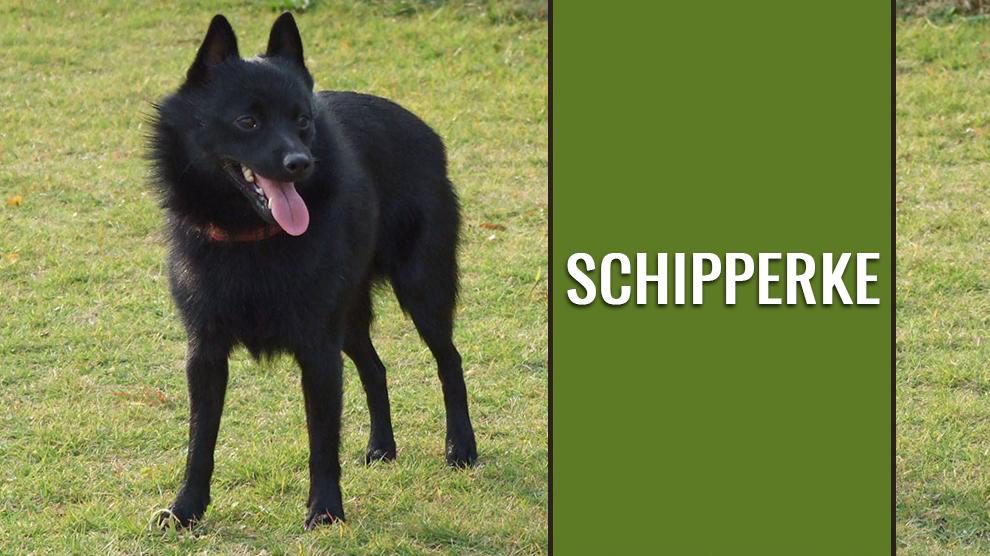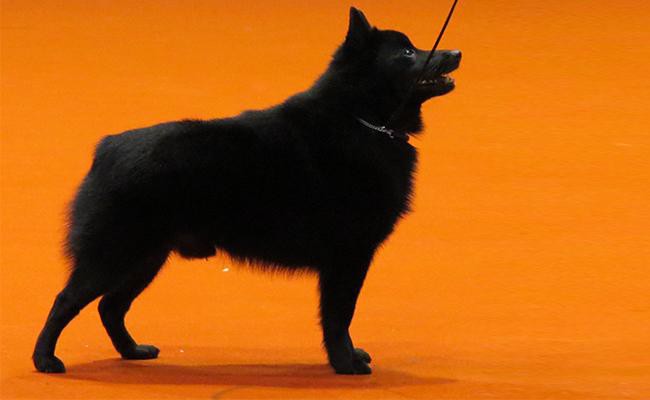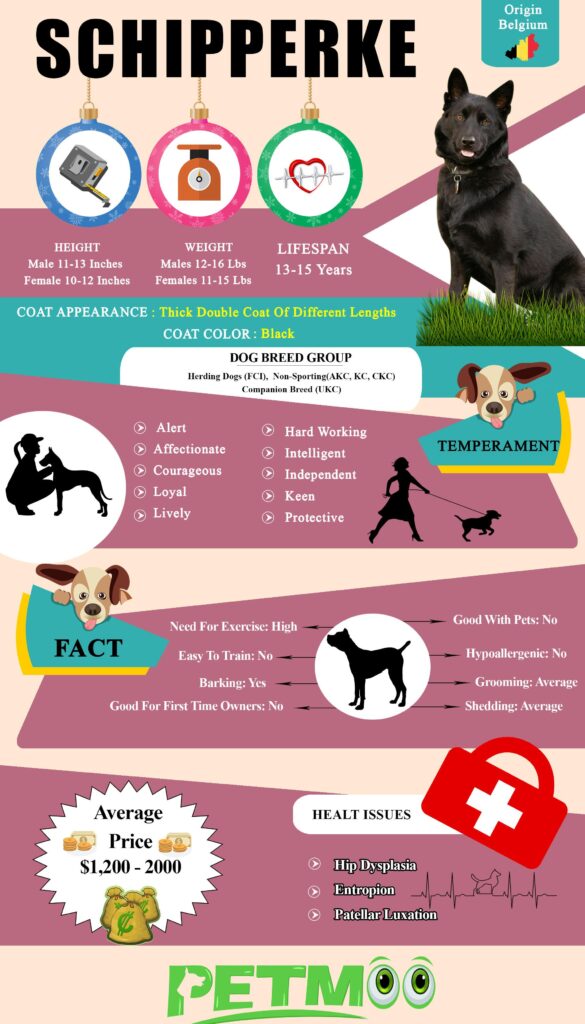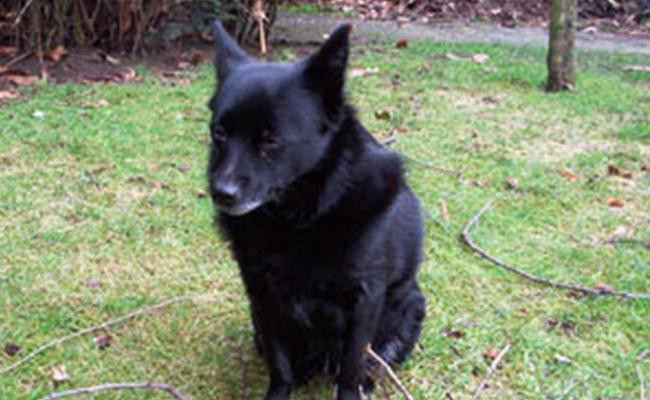Dog Pregnancy Calculator And Timeline
One of the most impetuous yet inquisitive breeds’ known- the Schipperke is a small, active, agile dog with a sparkly look that was originally developed to be a vermin killer and watchdog.
They are often fondly referred to as a little black devil (LBD). These black, Belgian beauties with the fox-like face resemble a very furry, kind of Pomeranians except they’re not as small.
There has been a long debate going on whether they belong to a Spitz-type dog (Northern breeds of dogs) or a miniature version of Belgian sheepdog.
They are also known as cabin boat dog, Tasmanian black devil, Belgian Barge Dogs, spits and schip dog. Pronounced as Ship Pur key, they have a madcap personality to go with his wacky name!
They are very lively, courageous and willful breed, adaptable to any setting be it on a barge vessel, farms, houses with/without yards or even an apartment, provided that you have deaf or tolerant neighbors( this is highly unlikely) to his barking.
Schipperke Pronunciation
Schipperke Breed Characteristics
- Origin: Belgium
- Size: Small
- Dog Breed Group: Herding Dogs(FCI), Non-Sporting(AKC, KC, CKC), Companion Breed (UKC)
- Purebred: Yes
- Lifespan: 13-15 Years
- Height: Male: 11-13 Inches (27 – 33 Cm), Female: 10-12 Inches (25 – 30 Cm)
- Weight: Males: 5 – 8 Kg (12-16 Lbs) And Females: 5 – 7 Kg (11-15 Lbs)
- Coat Appearance: Thick Double Coat Of Different Lengths
- Coat Colors: Black
- Temperament: Alert, Affectionate, Courageous, Loyal, Lively, Hard Working, Intelligent, Independent, Keen, Protective
- Good With Children: Yes, Older Children
- Intelligence Level: High
- Good With Pets: No
- Hypoallergenic: No
- Grooming: Average
- Shedding: Average
- Barking: Yes
- Suitable For Apartments: Yes
- Need For Exercise: High
- Easy To Train: No
- Good For First Time Owners: No
- Health Issues: Hip Dysplasia, Entropion, Patellar Luxation
- Litter Size: 5- 8 Puppies
- Average Price: $800- $ 1000
Schipperke History
These speedy little characters come with a rather interesting history.
Although it is widely thought that the Schipperke is a spitz toy-type breed similar to the Pomeranian.
They are also thought to be a member of the Non-Sporting Group and a miniature variety of Belgium black sheepdog called the Leauvenaar, a herding breed commonly found following Belgium bandwagons.
Leauvenaar is also an ancestor to the larger Belgian Shepherd. At a closer look, you can also see the Schip’s resemblance to another black Belgian Sheepdog (Groenendael).
It is speculated to have originated in the St. Gery district of Brussels and was used originally in the canal boats of Belgium that plied between Brussels and Antwerp.
The breed went by the name ‘spitske’ or simply ‘spits’ until it was renamed, Schipperke by the Schipperke Club of America in 1888. “Schip,” in Flemish means ship! Schipperke means ‘little captain of the ship’, so it makes total sense!
The breed grew in popularity after Queen Marie Henriette, who was the wife of King Leopold II saw one at the Brussels dog show in 1885. With rising popularity, the LBD was first brought to the United States in 1888.
The first United States Schipperke club was formed in 1905 which went defunct during the First World War, and then the current official Schipperke Club of America was founded in 1929.
Schipperke Size And Lifespan
Height: Male:11-13 inches (27 – 33 cm), female: 10-12 inches (25 – 30 cm)
Weight: Males: 5 – 8 kg (12-16 lbs) and Females: 5 – 7 Kg (11-15 lbs)
Lifespan
The average Schip dog life-span is about 13-15 years. When you get your Schip puppy from a reputable breeder, you will not encounter any major health issues.
Feed them a nutritious diet and when they are properly cared for, they can live as long as 15 years! Also, make sure to get them to the annual vet check. Don’t forget… they are worth the investment.
Schipperke Coat Color And Appearance
The normal affirmed coat color of this breed is black. However, the accepted breed colors as breed standard for Kennel Club registration can differ as other solid colors are also allowed such as cream, Apricot, Chocolate, blue, etc.
Coat
When it comes to their coat, schips possess beautifully dense double coat has different lengths. They have a rough, dense coat outer coat and a soft, thick undercoat.
Their coat is longer, thicker around the neck, shoulders, and rump; medium in length on the body, and shorter and smoother over the face, ears, and front legs.
Appearance
Schips aren’t a usual little dog you presume to be and they have a bit of a foxy look with an extremely alert, proud stance. They have a wedge-shaped, foxy head, without a prominent stop.
They have a moderately long muzzle that is nicely filled under the dog’s eyes. Their small nose is always jet-black in color.
Their almond eye is dark brown in color and always carries a bright, very expressive, mischievous look.
Small triangular ears are moderately long that taper to a point at the tips which move in response to the slightest sound.
Nicely rounded rumps with very cat-like feet look that like they are standing on their toes. Tails are well covered in hair and held tightly curled over the back.
Many dogs are born tailless and if they are born with a tail, it is often docked to the base.
Schipperke Temperament
The proverbial “big dog in a little dog’s body” suits well for schips. He’s energetic, self-assured, and inquisitive.
He’s usually a good buddy for grown-up, active kids, but he may not be the best choice for families with toddlers.
He is very sensitive and doesn’t tolerate unexpected roughhousing or teased by small kids. With suitable supervision, however, he is usually a good companion for all ages.
Protective, brave, and naturally apprehensive of strangers, he makes a fantastic watchdog. They are light sleepers and are always on high alert.
He will never fear to face intruders who seem to have evil intent and they are likely to be welcomed with a piercing bark.
Due to their size and laid-back nature, they adapt well in a variety of settings, ranging from large farmhouses and small apartments.
They are also up for an adventure, if needed, whether it’s going camping, hitchhiking or chasing a stick into the lake.
This is an inquisitive and intelligent little dog. He’s usually quiet, but anyone or anything that he feels ominous will set him to bark a warning.
With his mischievous curiosity, he loves to romp around in your garden or backyard; indeed, they have a high prey drive and make no mistake, they are very fast on their feet!
He cannot be trusted off-leash because many Schips will pursue vermins, chipmunks, rodents, and even low-flying birds.
Even if they are highly intelligent, their occasional stubborn streak will not lose color.
When it comes to other household pets, Schipps remain aloof or cold with new dogs, and they definitely tend to chase the family’s cats and other pets. They do best when they are the only dogs of the family.
Who should own Schipperke?
- Families with older children
- Active singles and seniors
- Apartment dwellers
- Houses with/without yards
Who Should Not?
Families with toddlers, First-time owners, and laid back households
Schipperke Food
The feeding generally depend on the dogs build, health, food sensitivity, eating tendency and activity level
These are favorite Non-veg foods that can be fed:
- Beef or lamb ribs with plenty of meat on them
- Wild omega-rich fish
- Chicken backs, necks, wings, and feet
- Eggs
- Liver (tiny quantities)
Best fruits and vegetables
- Sweet Potatoes
- Green Beans
- Papaya
- Cantaloupe
- Spinach And Broccoli
- Lettuce And Carrot
- Water Melon
Best dry Dog food for Schipps
- Wellness Complete Health Natural Dry Small Breed Dog Food
- BLUE Life Protection Formula Puppy Small Breed Chicken and Oatmeal Dry Dog Food
- Diamond Naturals Small Breed Puppy Real Meat Recipe Natural Dry Dog Food
- Tuffy’s NutriSource Chicken and Rice Formula Breed Dry Puppy Food
- Bil Jac Small Breed Puppy Dry Dog Food
Best food for puppies with food allergy
- BLUE Freedom Grain-Free Puppy Dry Dog Food.
- Merrick Lil’ Plates Grain Free Real Chicken + Sweet Potato Small Breed Dry Puppy Food
- Solid Gold Small & Toy Breed Wet & Dry Dog Food
- Wellness Core Natural Grain Free Dry Dog Food
- Nulo Freestyle Limited Plus Grain Free Puppy and Adult Dog Food
Schipperke Care
Schipps Grooming is a less maintenance dog. Don’t worry about frequent grooming. Brushing can be done once or twice a week during non-shedding seasons.
They are an extremely active dog which needs a lot of exercise and attention to vent off their energy.
When they are not provided with the right amount of exercise, they may indulge in destructive activities around the home which is their way of relieving any stress.
The recommended duration for activity per day is at least 40-60 minutes and 7 miles walk per week.
Those who have fenced garden can let these dogs roam around, so they can really let off steam.
However, the fencing has to be extremely secure as they cannot be trusted off-leash. They are great escape artists and they will soon get into all sorts of trouble.
When they are left alone for long periods of time, they are prone to suffer from separation anxiety.
You are sure to get complaints from your neighbors due to their anxiety relief barking or you may find some super good holes in your backyard.
Older dogs when adopted may be difficult to housebreak, but puppies wouldn’t test your patience too much in housebreaking. In fact, they can be surprisingly responsive.
Schipperke Training
Schipperkes can be a fantastic breed for experienced owners, but he can’t just fit into any home, just like that.
Training can be a little difficult as they are chasers and have a high prey drive. They’re also so inquisitive and they poke their nose into everything!
First-time owners should talk to breeders and other experienced owners before getting one and those who are interested in this breed should do their homework.
Early, continual and extensive socialization is an absolute must. Obedience training is also good for them.
Obedience training and socialization need to be consistent and reasonable. Begin your training when your dog is in puppyhood and before they become boisterous or enroll him in obedience classes.
The dogs that are not properly socialized or trained may develop aggression toward other pets/animals, and makes them unsafe if they don’t know how to interact with them.
Shedding And Grooming
They have short; double coats with rough, dense outer coats and their inner coats are very soft. The good news is they are low maintenance on the grooming front and all it takes is a weekly brush to keep their coats in good condition.
Generally, they are considered self-grooming animal; still, you want to make sure your Schip is regularly groomed to keep them healthy and maintain an overall coat quality.
They shed mildly throughout the year and profusely twice a year during spring and fall season. Frequent brushing during shedding seasons will make them stay on top of things.
Before starting the brushing routine, it is good to apply a little corn starch with the soft side of a pin brush. This will soften the coat and makes easy it for brushing offset.
After that, use a soft pin-brush and a comb with wide teething to brushing the coat. If there are any tangles in the neck and shoulders, use the slicker brush delicately to open up any tangles and then brush it with caution.
Like any other dog, taking care of dental hygiene, nail clipping and checking ears should be done regularly.
Schipperke Health Problems
They are usually a healthy breed. However, this breed may be affected by the following diseases.
Hip Dysplasia
Hip dysplasia is also found in schipperkes but not to the extent in other dog breeds. This is usually a genetic disease through dietary and environmental factors also contribute to the problem.
When the hips become unstable during the development stages in the first few months of life, this causes the femoral head (the ball) to fit poorly in the acetabulum as they are incapable of bearing the weight.
This causes uneven forces on the soft bones which lead to the flattening of the femoral head and the socket also becoming shallow.
Entropion
This is a common canine disease occurring in the lower or upper eyelids and also along the sides of the eyes (medial and lateral.
They are overturned i.e. it is upturned or rolled inwards causing drippy, irritated eyes. This abnormal conformation of the eyelids can be inherited/genetic, spastic, and acquired.
The signs of entropion include squinting (called blepharospasm), excessive tearing, rubbing and pawing at the eyes, photosensitivity, dark brown pigment formation on the cornea, corneal ulceration, etc.
Legg-Calve-Perthes disease(LCPD)
Also known as avascular or aseptic necrosis of the femoral head, this is a developmental orthopedic disease in which the femoral head (the top part of the thigh bone) spontaneously begins to degenerate.
Eventually, this degeneration will cause a collapse of the hip and lead to arthritis. Symptoms of LCPD disease include Trouble getting up and walking, Holding one leg up, Pain and discomfort in the hip joint and lameness.
Schipperke Puppies Names
Male Puppy Names
- Anchor
- Blackie
- Captain
- Caspian
- Dusty
- Jack
- Einar
- Frans
- Rudder
- Skipper
Female Puppy Names
- Angel
- Ariel
- Coral
- Ginger
- Pearl
- Maggie
- Natasha
- Regina
- Stacy
- Rachel
Schipperke Price And Breeders
The price of puppies will be $ 800- 1000 and up from a reputable breeder.
Keep in mind that there are also vaccines, licenses, preventative medicine, heartworm testing and – if needed – spaying or neutering. Just add extra $500 to the actual price.
Breeders
Take a look of our list for the most reputable Schipperke breeders.
- Willow Schipperkes Monterey, California
- FullMoon Schipperkes Ashford, Connecticut
- Zephyr Schipperkes Wakeman, Ohio
- Skydance Schipperkes Anoka, Minnesota
- Kleingaul Schipperkes Winlock, Washington
- Minneka Schipperkes Holt, Missouri
- Kunic Ranch San Miguel, California
- Mardeck & Deloran Schipperkes Cazenovia, New York





















